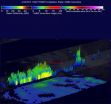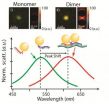(Press-News.org) WASHINGTON – A changing climate is increasing the accessibility of U.S. Arctic waters to commercial activities such as shipping, oil and gas development, and tourism, raising concern about the risk of oil spills. A new report from the National Research Council says that a full suite of proven oil response tools is needed to address potential oil spills in U.S. Arctic waters, but not all of them are readily available. While much is known about both oil behavior and response technologies in ice-covered environments, there are areas where additional research would enable more informed decisions about the most effective response strategies for different Arctic spill situations, the report adds.
The Arctic poses several challenges to oil spill response, including extreme weather and environmental settings, limited operations and communications infrastructure, a vast geographic area, and vulnerable species, ecosystems, and cultures. The report finds that there is a need to validate current and emerging oil spill response technologies under these real-world conditions, and recommends that carefully controlled field experiments that release oil in the U.S. Arctic be conducted as part of a long-term, collaborative Arctic oil spill research and development program that spans local, state, and federal levels.
A decision process such as the Net Environmental Benefit Analysis, which weighs and compares the advantages and disadvantages of different response options, should be used to select the response tools that offer the greatest overall reduction of adverse environmental harm, the report says. Key response options include biodegradation, chemical dispersants and herders, in situ burning, and mechanical containment and recovery. While in situ burning is pre-approved for use in the Arctic under defined conditions, Alaska has not granted pre-approval for use of chemical dispersants.
Research areas that would improve science-based decisions about the use of response technologies include determining the biodegradation rates of hydrocarbons in offshore environments and which strategies can accelerate oil degradation; evaluating the toxicity and long-term effects of dispersants and dispersed oil on key Arctic marine species; and communicating the limitations of mechanical recovery in both open water and ice.
Due to the range of conditions typically encountered within the Arctic, no single technique will apply in all situations, and in some cases a viable response option might be no response. A combination of countermeasures, rather than a single response option, may provide optimal protection, and so the response toolbox requires flexibility to evaluate and apply multiple options if necessary, the report says.
Building U.S. capability for Arctic oil spill response will also require additional infrastructure. The report finds that current personnel, equipment, transportation, communication, navigation, and safety resources for overseeing a spill response in the Arctic are not adequate, and calls this absence of infrastructure a "significant liability" in the event of a large oil spill. It suggests that positioning response equipment such as aerial in situ burn and dispersant capabilities in the region in advance of a spill would provide immediate access to rapid response options. Furthermore, the U.S. Coast Guard's presence and performance capacity in the Arctic should be enhanced.
Given the proximity of U.S. Arctic waters to international territories, certain factors should be addressed in advance of an actual event, including communications between command centers, coordinated planning, trans-boundary movement of people and equipment, and identification of translators, the report says. While formal contingency planning and exercises with Canada have been established, the U.S. Coast Guard should expand its bilateral agreement with Russia to include Arctic spill scenarios and conduct regularly scheduled exercises to establish joint response plans, the report recommends.
The Coast Guard should work with the Alaska Department of Environmental Conservation to develop an oil spill training program for local communities and trained response teams in local villages. They should also integrate local and traditional knowledge of ice and ocean conditions and marine life to enhance oil spill response, the report says.
INFORMATION:
The study was sponsored by the U.S. Arctic Research Commission, American Petroleum Institute, U.S. Coast Guard, U.S. Department of the Interior, Bureau of Ocean Energy Management, Bureau of Safety and Environmental Enforcement, Marine Mammal Commission, National Oceanic and Atmospheric Administration, Oil Spill Recovery Institute, and the National Academy of Sciences. The National Academy of Sciences, National Academy of Engineering, Institute of Medicine, and National Research Council make up the National Academies. They are private, independent nonprofit institutions that provide science, technology, and health policy advice under a congressional charter granted to NAS in 1863. The National Research Council is the principal operating arm of the National Academy of Sciences and the National Academy of Engineering. For more information, visit http://national-academies.org. A committee roster follows.
Contacts:
Lauren Rugani, Media Relations Officer
Monica White, Media Assistant
Office of News and Public Information
202-334-2138; e-mail news@nas.edu
http://national-academies.com/newsroom
Twitter: @NAS_news and @NASciences
RSS feed: http://www.nationalacademies.org/rss/index.html
Flickr: http://www.flickr.com/photos/nationalacademyofsciences/sets
Pre-publication copies of Responding to Oil Spills in the U.S. Arctic Marine Environment are available from the National Academies Press on the Internet at http://www.nap.edu or by calling 202-334-3313 or 1-800-624-6242. Reporters may obtain a copy from the Office of News and Public Information (contacts listed above).
NATIONAL RESEARCH COUNCIL
Division on Earth and Life Studies
Ocean Studies Board
Polar Research Board
Transportation Research Board
Marine Board
Committee on Responding to Oil Spills in Arctic Environments
Martha R. Grabowski (chair)
Professor and Chair
Business Administration Department
LeMoyne College
Cazenovia, N.Y.
Thomas Coolbaugh
Distinguished Scientific Associate
ExxonMobil Research and Engineering Co.
Fairfax, Va.
David F. Dickins
President
DF Dickins and Associates LLC
Del Mar, Calif.
Richard K. Glenn
Executive Director
Arctic Slope Regional Corp.
Barrow, Alaska
Kenneth Lee
Director, Wealth from Oceans National Research Flagship
Australian Resources Research Centre
Kensington, Western Australia
William L. Majors
Manager, Planning and Development
Alaska Clean Seas
Prudhoe Bay
Mark D. Myers
Vice Chancellor of Research
University of Alaska
Fairbanks
Brenda Norcross
Professor of Fisheries Oceanography
School of Fisheries and Ocean Sciences
University of Alaska
Fairbanks
Mark Reed
Senior Research Scientist
SINTEF Materials and Chemistry
Trondheim, Norway
Robert Suydam
Senior Wildlife Biologist
Department of Wildlife Management
North Slope Borough
Barrow, Alaska
James M. Tiedje*
University Distinguished Professor and Director
Center for Microbial Ecology
Michigan State University
East Lansing
Mary-Louise Timmermans
Assistant Professor
Department of Geology and Geophysics
Yale University
New Haven, Conn.
Peter Wadhams
Professor of Ocean Physics
University of Cambridge
England
STAFF
Deborah Glickson
Senior Program Officer
* Member, National Academy of Sciences
Increased infrastructure required for effective oil spill response in US Arctic
2014-04-23
ELSE PRESS RELEASES FROM THIS DATE:
On the defensive
2014-04-23
People diagnosed with Huntington's disease, most in their mid-thirties and forties, face a devastating prognosis: complete mental, physical, and behavioral decline within two decades. "Mutant" protein clusters, long blamed for the progression of the genetic disease, have been the primary focus of therapies in development by pharmaceutical companies. But according to new research from Prof. Gerardo Lederkremer and Dr. Julia Leitman of Tel Aviv University's Department of Cell Research and Immunology, in collaboration with Prof. Ulrich Hartl of the Max Planck Institute for ...
ASTRO issues guideline on the role of postoperative radiation therapy for endometrial cancer
2014-04-23
Fairfax, Va., April 23, 2014— The American Society for Radiation Oncology (ASTRO) has issued a new guideline, "The Role of Postoperative Radiation Therapy for Endometrial Cancer: An ASTRO Evidence-Based Guideline," that details the use of adjuvant radiation therapy in the treatment of endometrial cancer. The guideline's executive summary is published in the May-June 2014 issue of Practical Radiation Oncology (PRO), the official clinical practice journal of ASTRO. The full-length guideline is available as an open-access article online at http://www.practicalradonc.org.
ASTRO's ...
Conservation priorities released for several protected areas along US-Mexico border
2014-04-23
This news release is available in French and Spanish.
Montreal, 23 April 2014—Today, the CEC released its Conservation Assessment for the Big Bend-Río Bravo Region: A Binational Collaborative Approach to Conservation, which identifies 29 priority conservation areas in a region straddling the United States-Mexico border that includes 11 different protected areas in the states of Texas, Coahuila, and Chihuahua. This region features unique, highly diverse arid and semi-arid habitats inhabited by rare and endangered plants and animals, and provides a vital migratory ...
Novel compound halts cocaine addiction and relapse behaviors
2014-04-23
BUFFALO, N.Y. – A novel compound that targets an important brain receptor has a dramatic effect against a host of cocaine addiction behaviors, including relapse behavior, a University at Buffalo animal study has found.
The research provides strong evidence that this may be a novel lead compound for treating cocaine addiction, for which no effective medications exist.
The UB research was published as an online preview article in Neuropsychopharmacology last week.
In the study, the compound, RO5263397, severely blunted a broad range of cocaine addiction behaviors.
"This ...
NASA sees last vestiges of Tropical Depression Jack
2014-04-23
Tropical Cyclone Jack had weakened to a tropical depression when NASA and JAXA's Tropical Rainfall Measuring Mission (TRMM) satellite passed above on April 22, 2014 at 1120 UTC/7:20 a.m. EDT.
At that time, TRMM found that Jack was devoid of almost all rainfall near the tropical cyclone's center. Outside the center was a different story, however. That's where TRMM's precipitation radar instrument found rain falling at a rate of over 130mm/hr (about 5.1 inches) in a band of thunderstorms that stretched from east of Jack's center to the south. Some of the thunderstorms even ...
EARTH Magazine: Faking quakes at full scale
2014-04-23
Alexandria, Va. – On a muggy day in mid-July 2009, a lone seven-story condominium complex northwest of Kobe, Japan, was violently shaken by an earthquake. Onlookers watched the 23-unit, wood-frame tower sway and bounce while, inside the building, furniture toppled and plates clattered to the floor. No one was hurt during the highly localized event and there was only minimal damage, in part because the building's wooden skeleton had been augmented to better resist earthquake shaking, but also because the whole event — from the seismicity to the partially furnished building ...
Some astronauts at risk for cognitive impairment, animal studies suggest
2014-04-23
Johns Hopkins scientists report that rats exposed to high-energy particles, simulating conditions astronauts would face on a long-term deep space mission, show lapses in attention and slower reaction times, even when the radiation exposure is in extremely low dose ranges.
The cognitive impairments — which affected a large subset, but far from all, of the animals — appear to be linked to protein changes in the brain, the scientists say. The findings, if found to hold true in humans, suggest it may be possible to develop a biological marker to predict sensitivity to radiation's ...
Gold nanoparticles help target, quantify breast cancer segments in a living cell
2014-04-23
WEST LAFAYETTE, Ind. - Purdue University researchers have developed a way to detect and measure cancer levels in a living cell by using tiny gold particles with tails of synthetic DNA.
A team led by Joseph Irudayaraj, professor of agricultural and biological engineering, used gold nanoparticles to target and bind to fragments of genetic material known as BRCA1 messenger RNA splice variants, which can indicate the presence and stage of breast cancer. The number of these mRNA splice variants in a cell can be determined by examining the specific signal that light produces ...
Study identifies enzymes that help fix cancer-causing DNA defects
2014-04-23
Purdue University researchers have identified an important enzyme pathway that helps prevent new cells from receiving too many or too few chromosomes, a condition that has been directly linked to cancer and other diseases.
Mark Hall, associate professor of biochemistry, found that near the end of cell division, the enzyme Cdc14 activates Yen1, an enzyme that ensures any breaks in DNA are fully repaired before the parent cell distributes copies of the genome to daughter cells. This process helps safeguard against some of the most devastating genome errors, including the ...
A key to enjoying massive online photo files may be giving up some control
2014-04-23
PITTSBURGH—The ability of individuals to store and instantly access thousands of their photos online has become a commonplace luxury, but the sheer size of these archives can be intimidating. Researchers at Carnegie Mellon University and Microsoft Research Cambridge, UK, have found people might actually enjoy their collections more by giving up a bit of control and learning to wait.
Their 14-month study showed that people reflected more on past events and developed a renewed interest in their online photos when a device called Photobox would randomly print four or five ...




